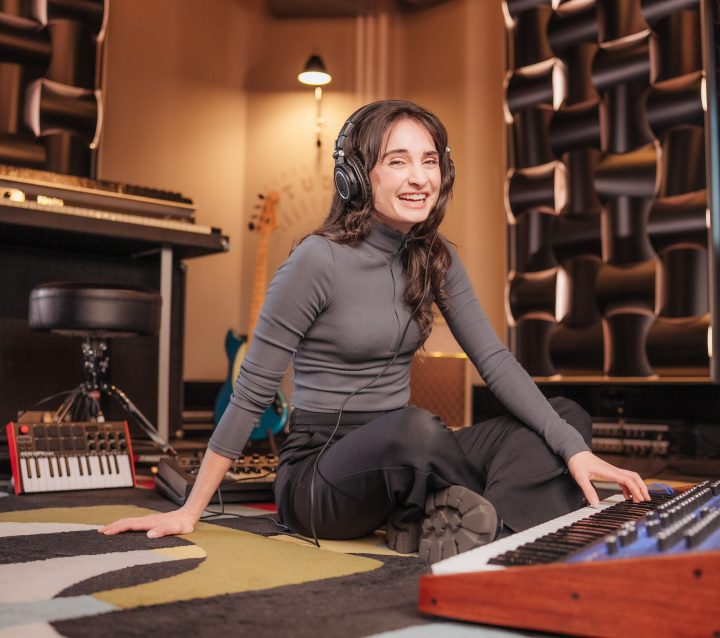Please tell us your story! How did you get to where you are today?
I grew up playing piano and choreographing dances to my favourite artists’ music. I remember being in highschool dance classes, where I began writing and producing music to dance to for some of my assessments. When I reflect, creating music was always there, writing pop tracks in secret because I didn’t think I was ever any good at it. It wasn’t until I moved to Melbourne, that pursuing music actually felt like an option. I started doing some part-time production courses through Box Hill Institute and from there went on to do a Bachelor in Applied Music & Audio Engineering. It was in my second year that I had a major freak out, asking myself if I would actually have a job at the end of the degree; knowing at this point the statistics for women in audio were extremely low and I was watching this play out in real time. My course started with myself (female) and 2 other non-male identifying people. By the 3rd year I was the only one left that graduated. This prompted a meeting with my course adviser, who graciously set me up as an assistant engineer working alongside Anna Laverty on the recording of The Women of Soul album – ‘Feel Good’. I can honestly say without this specific opportunity, and the support and mentoring of Anna, there’s no way I would be where I am today. There have been quite a few good people along the way that have made a significant impact on my audio journey, but I see this moment as the catalyst to my career’s current trajectory.
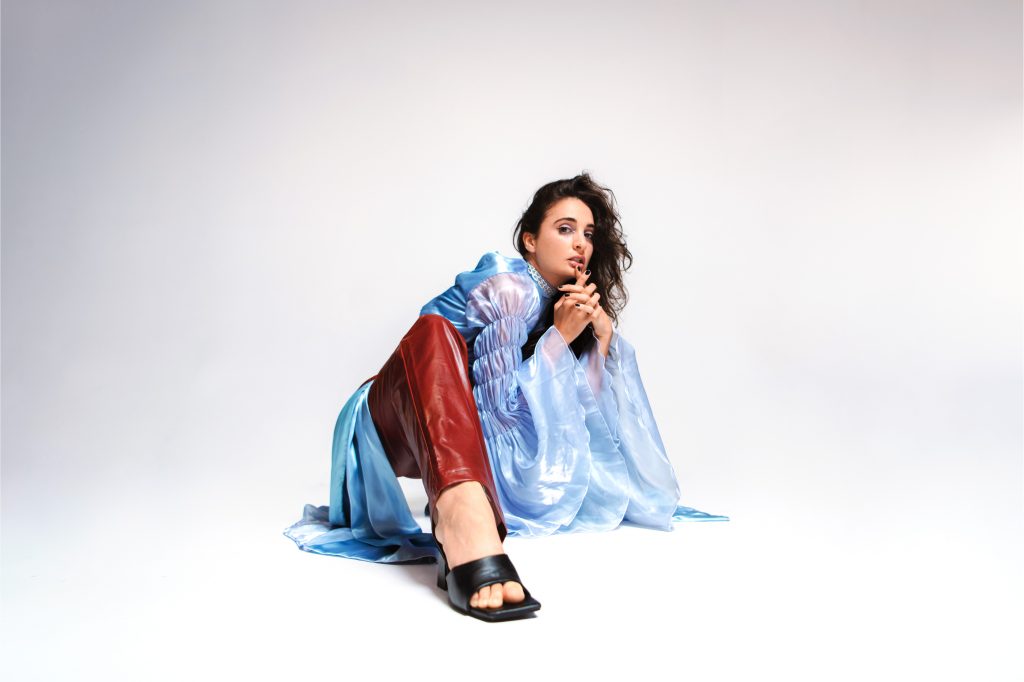
Why did you want to get into the music industry?
Initially it started with a love of music and singing. I had moved to Melbourne in 2016 to train in acting and we had classes that were ‘singing for actors’. I loved singing in these classes. One day I was in the middle of a monologue and the acting coach asked me, “what do you love to do? What makes you happy?” I replied with the first thing that came to mind, “singing, music… ah crap what am I doing here!?” From that moment I picked up piano again and started creating and producing music.
You wear many hats in your profession as an engineer, producer, songwriter and artist. Do you have a particular area that you enjoy more than others?
Honestly, I feel like each informs and fuels the other. I love creating as an artist. It’s fully expressing the different facets of my being and inner monologue; whilst producing, engineering and teaching dance feels like a way I can gently hold space and support others in bringing their own creative visions to reality. My curiosity and love for the more technical side of engineering feels like the sum of my scientific parents’ essence, something that managed to seep into at least one of their children who both took artistic career paths.
“Life will shift and wane, so too will your thoughts, feelings and goals, sometimes in unexpected ways. Set your goals but don’t worry if they change, keep following your joy even if you can only see or feel a little bit of it at the time.“
Tell us about your solo project RAYHAB…
I’m really excited about this project! I’m actually released a new track ‘Overkill’ on September 18th! RAYHAB is the culmination of every creative path I’ve ever ventured into, it’s a full creative expression of self. I was pretty stubborn with this first upcoming body of work. I needed to write, produce and mix it myself, whether it was to trump imposter syndrome, or to simply have something that I could reflect on with joy, and say I created that and it is good and it is valid. Performatively, I’m incorporating some state of the art tech that my friend Alon created. It essentially allows my body to create sound. My band and I have started rehearsing and it’s going to be really interesting as to where we take the sonics and overall performance. It’s the first band I’ve been in where the majority of members are also engineers. So you’d hope if any tech issues occur they’d be resolved swiftly… that, or we’ll all just be geeking out on gear.
Let’s talk about the highs vs the lows of your career. What is your greatest achievement? And are there any moments you would like to share that you learnt greatly from?
In the beginning I came home in tears after every shift. I watched my junior, male colleagues be offered all the opportunities, whilst I was treated like an errand boy – convenient, cheap labour.
The true highs of my career have been when I’m actually playing music/creating/producing/engineering with artists who have become my friends. Shout out to Marigolden – without fail, by the end of every session together, we’ll be dancing to what we’ve created!
A moment that comes to mind in which I learnt a great lesson was when I was working under Eric J Dubowsky. He gave me some vocals to tune for a big artist, but I didn’t nail it, and he didn’t end up using the work I’d done. For the next 3 months I vocal tuned every day to ensure that wouldn’t happen again. What I learnt was, yes I want to be prepared… but also chill out. Working myself up into an anxious mess because I got something wrong, wasn’t going to allow me to have a sustainable career. I think you need to decide what you want and what you’re prepared to sacrifice, but remember why you started the journey in the first place.
What has been your proudest achievement so far?
You think the first thing that would come to mind would be having a hand in an ARIA winning project, albeit a very small hand (de-clicking vocals… a girl’s gotta take what she can get). Honestly, I think where I find the most satisfaction is when I produce a track and I think it’s a vibe, or the artist I’m working with thinks it’s awesome and people actually connect to it.
What is your big picture career goal?
I think at any given time I long for community and to be surrounded by good, supportive people. So if I can foster that for myself and others in the course of my career, whilst creating amazing music as an artist and/or producer, then I certainly feel as though that’s a goal worth pursuing.
“If there was enough support for women, we’d see far more women/GNC individuals at the helm in studio spaces. Look at the statistics, walk into a studio, have a look around… do you see equality? If not, ask yourself, why? Are you, as an artist, working with women or GNC people? Ask yourself, why? And honestly reflect… is it due to unconscious bias?”
Who has been your biggest champion in your career?
There have been different people at different stages, but notably Anna Laverty has supported and advocated for me from the moment we first worked together, she has been an incredible mentor and friend.
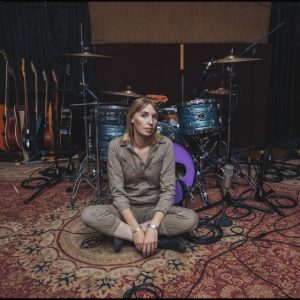
More recently Milly Petriella has supported and advocated for me, again, a wonderful mentor and support particularly with my artist project, RAYHAB. I’m very grateful to APRA for connecting us.
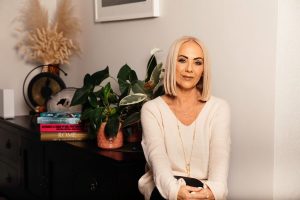
And lastly, Forbes Street Studios’ manager Nick Rowse who continues to affirm my capability, support my engineering growth, whilst also creating real, paid production and engineering work opportunities.
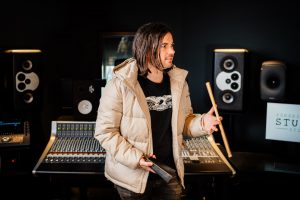
Who are your top 3 artists to watch?
Top 3 to watch is hard… I’m loving Rowena Wise
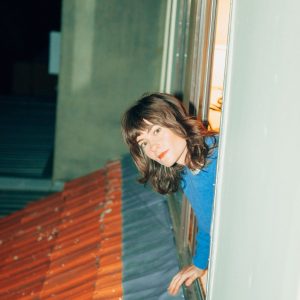
and Marigolden from Melbourne,
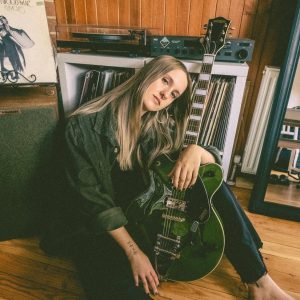
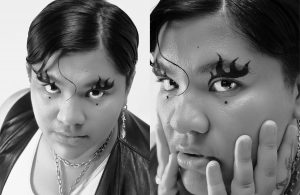
and Yasmina Sadiki from Sydney.
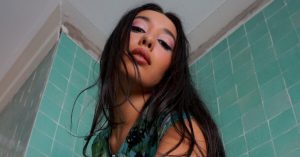
But, there are so many incredible local independent artists. So much so that I’ve actually been reaching out to my community to help create Spotify playlists to support our local creatives. I would encourage people to go listen/follow the playlists and artists on these playlists, just hearing the quality of independent Aussie music out there has been both inspiring and refreshing. It’s cool when you hear an amazing track on the radio, but it’s something else when you find a random human around the corner from you who has been making some weird, wonderful and heartfelt songs. I’ve started locally and am in the midst of Making some for every state 🙂 Reach out if you want to add to the playlist <3
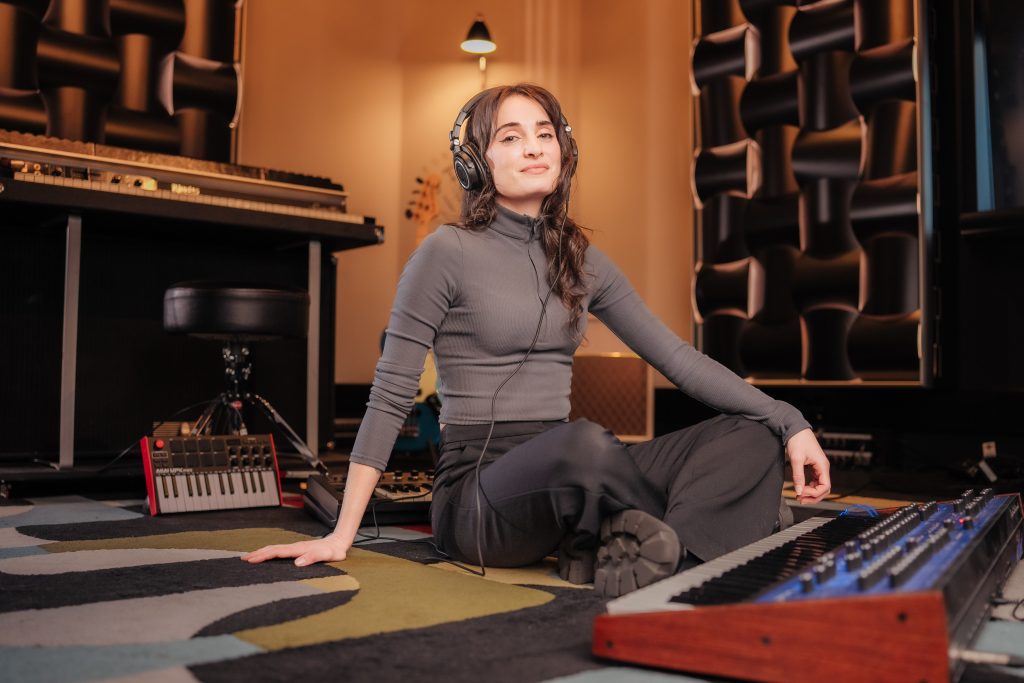
Who are your role models in the industry be they local or international?
Do they need to be alive? Clara Rockmore comes to mind more often than she probably should. I reckon I’ve subconsciously related to an ailment she obtained in her teens which saw her heading down, let’s say, a less conventional road. Also inspired by Lady Gaga, Sylvia Massy, Brian Eno and David Byrne.
“I think you need to decide what you want and what you’re prepared to sacrifice, but remember why you started the journey in the first place.”
Does your area of the industry have adequate infrastructure that is supported by the Government? If not, what would you like to see more of?
Not to my knowledge, but I’m more than happy to be corrected. A particular question that always plays on my mind is, “what do I do if someday in the future I want to have kids?” Where is the support around that? It is something that I know women in this industry have had to sacrifice. It’s hard work and there is a lot of instability. I feel there needs to be more transparent government regulation around minimum pay for sub-contracted studio workers, as well as there being support, infrastructure and guidance for those transitioning from tertiary education into a career in audio engineering. In the current climate it is not realistic for young students to be expected to intern for free. Just because it’s the way it’s always been, doesn’t make it okay. I know there are amazing groups such as Support Act, APRA AMCOS, and of course One of One who are tackling the hard issues head on. But I do feel as though the government needs to be doing more to support women, audio engineers, and the music industry in general, specifically those who are independently trudging forward.
Do you think the Australian Music Industry is where it needs to be in regards to diversity? If yes or no, what would you like to see/have you seen?
No, I don’t. I can only speak from what I’ve seen, and again there are good people making fantastic steps forward. But the truth is that it’s still a rarity to walk into a studio and not see a man at the helm of the operation. I think as a whole we need to be thinking innovatively about how we move forward in every facet of the music industry.
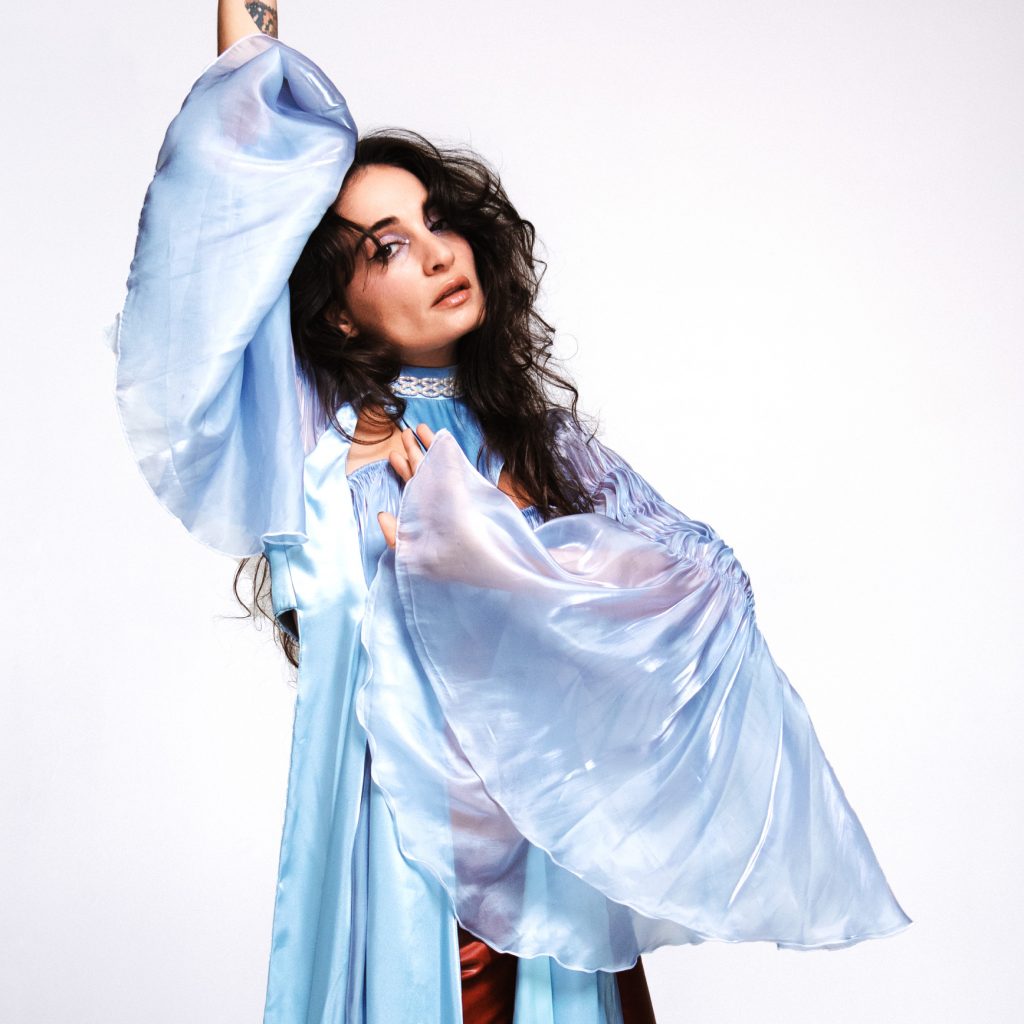
Is there enough support for Female producers? If not, what would you like to see?
I personally don’t believe there is enough support. I certainly don’t want to discount the amazing work that One of One, Support Act and APRA are doing, but there needs to be more. If there was enough support for women, we’d see far more women/GNC individuals at the helm in studio spaces. Look at the statistics, walk into a studio, have a look around… do you see equality? If not, ask yourself, why? Are you, as an artist, working with women or GNC people? Ask yourself, why? And honestly reflect… is it due to unconscious bias? As humans we tend to tip the scale greatly in one direction, then the other, before we find balance. So basically, if you still hear people “whinging”, it means the issue hasn’t been resolved yet.
Is the production side of the industry gatekept?
I think it depends where you’re working. Whilst I have experienced gatekeeping, I’ve also experienced really great people advocating for me, and I certainly wouldn’t be where I am if I hadn’t stumbled on a beautiful community of engineers and producers. It is good to understand that some corporate spaces have hierarchy, and I think that’s important to consider if you’re thinking you may like to work in that kind of space.
Self identity & imposter syndrome are issues Women & GNC Folks in the industry struggle with. Have you faced this issue? If so/not, what tips can you give to encourage others to stand in their truth?
Absolutely. I want to be honest about this because I don’t believe real change can come about if we continue to tiptoe around it in order to maintain favour. I believe it is a complex issue and there is no one answer, but I can speak to my own experience. If I mess up, as a woman, there are preconceived ideas in place that deem me ‘a shit producer or engineer’. Not only that, there are some engineers who will talk down to you and make you feel like the task is harder than it actually is – because it looks like a ‘spaceship’, a lady couldn’t possibly know what she’s doing. You’re made to feel like it’s so hard, and you’re crapper than you actually are. I personally could never go into a job lying about my capacity. I need to ensure that everything I do will work, and I’ve worked hard to nail it. I have known so many guys that go into jobs not having a clue and lying about their capacity. The conversation actually came up with my partner on our first date. He said that in the past he had lied about his capability on paper to get work, and I told him I would never hire him, let alone date him… and we all know how that turned out (we are still together, it’s actually going really well, thanks haha).
“There needs to be a way for up and coming engineers to get hands-on experience without being exploited for free labour.”
Why does representation matter?
As my mentor would wisely say, “you can’t be what you can’t see.” I experienced this growing up in a coastal suburb, where boys were encouraged to play in bands, and women who got up and sang at school were made fun of. There’s a culture, and sometimes that culture supports some people more than others. It takes a community to back an individual and so we should be backing and encouraging each other, always.
What is tokenisation?
Employing women or GNC people solely to promote a studio on socials or fill a quota, and not actually giving them real paid work, support and opportunities in the field they trained in.
Have you always felt safe in the industry?
Not exactly, but I feel very lucky that I landed in spaces with engineers like Anna Laverty and my current position at Forbes that have made me feel nurtured and supported.
What does a safespace look like to you?
Shameless plug, but genuinely Forbes Street Studios has revealed itself as a safespace, and that is really due to the leadership of Anthony Gavin and Nick Rowse. That’s because there is trust, there is kindness, there is support and real opportunities. When you have a studio manager that believes in you, rather than sceptical of your ability, it creates a space to grow and thrive.
“just hearing the quality of independent Aussie music out there has been both inspiring and refreshing. It’s cool when you hear an amazing track on the radio, but it’s something else when you find a random human around the corner from you who has been making some weird, wonderful and heartfelt songs.”
What would you tell your younger self if you could tell them anything?
Life will shift and wane, so too will your thoughts, feelings and goals, sometimes in unexpected ways. Set your goals but don’t worry if they change, keep following your joy even if you can only see or feel a little bit of it at the time.
What is your go to song for Karaoke?
Earlier this year, in a karaoke bar in the backstreets of Bordeaux, I discovered that I know all the words to Tenacious D’s Best Song in the World – so I’m dubbing that my current go to.
